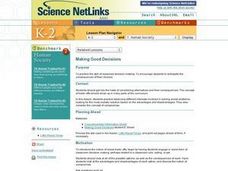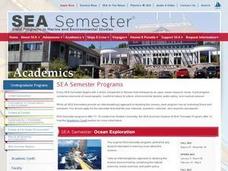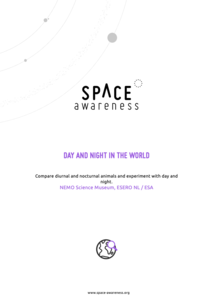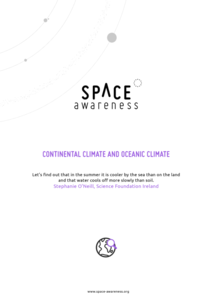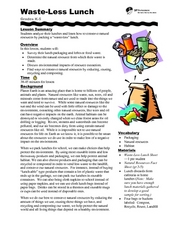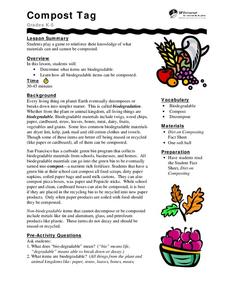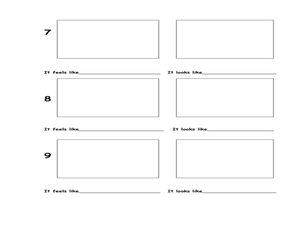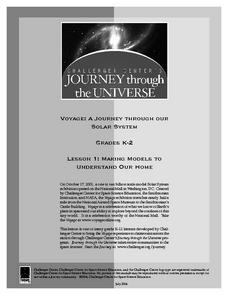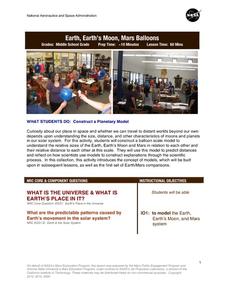Curated OER
Making Good Decisions
Learners consider alternative decisions and consequences. In this decision making lesson, students role-play in a social problem. They look for a realistic solution based on advantages and disadvantages.
Curated OER
Waters of the Earth
Learners make a striking visual display showing the distribution of water on earth.
Space Awareness
Day and Night in the World
How do different parts of the world experience day and night? Introduce scholars to the concept of global citizenship while teaching about animal behavior with discussion of nocturnal and diurnal animals. Then, learners complete...
Curated OER
The Potential Consequences of Climate Variability and Change
Students analyze the impact of climate variability and change utilizing a broad span of topics over a wide range of grade levels. This three lesson plan unit is easily adapted for the various instructional levels listed.
Space Awareness
What is a Constellation
Why do some stars in a constellation appear brighter than others? Using a get-up-and-move astronomy activity, scholars explore perspective and the appearance of constellations in the sky while developing an understanding of the...
Space Awareness
Continental Climate and Oceanic Climate
There's nothing better than a cool breeze blowing in from the ocean. Scholars explore how water affects change in temperature using a hands-on experiment on climate. They use measurement tools to compare the continental and oceanic...
Curated OER
Environmental Exchange Box
Young scholars examine the characteristics of their own environment and compare them to another region. They prepare a box filled with items and stories about their own region, exchange the box with another class in another region, and...
California Academy of Science
Tropical Belt
Where in the world is the equator? Explore a world map with your class, coloring in oceans, continents, and rainforests while locating the three major lines of latitude: the equator, Tropic of Cancer, and Tropic of Capricorn. Discuss how...
SF Environment
Waste-Less Lunch
Is it possible to have a waste-less lunch? Can your class become leaders in conservation? Discuss the importance of reducing waste during lunch time with a fun instructional activity that can be extended to everyday practices. First the...
SF Environment
Compost Tag
Composting is a great way to get children involved in recycling. First, they discuss how biodegradable products decompose to make compost. Then, they talk about what can and cannot be composted. They play a game similar to around the...
Curated OER
Where Is Saturn in the Solar System? Where Am I in the Solar System?
Young scholars engage in a solar system activity, In this activity, students will read aloud as a class about the solar system. The young scholars will then listen to the teacher read a solar system book prior to filling out a...
Curated OER
Earth to Saturn, Earth to Saturn!
Students compare and contrast the characteristics of Earth and Saturn. They practice writing analogies using those characteristics. They complete a worksheet to end the lesson.
Curated OER
Exploring Marine Objects
Students identify the sources of water on Earth. In this life science lesson, students list the different plants and animals that live in the ocean. They explore marine objects in the lab and draw them.
Curated OER
Winter Season
Students recognize the relationship between Earth's tilt and the Winter season. In this Winter instructional activity, students work in pairs to complete make frost and design snow goggles. Students experiment a hand lens to study the...
Curated OER
Water Works Wonders
Students examine where water is found in the world, how we use it, and the various forms it takes. They observe the refraction of light through a prism, record the day and night sky over a week's time, and create a topographic model of...
Curated OER
SKY PATHS: STUDYING THE MOVEMENT OF CELESTIAL OBJECTS
Students observe the position of an object in the sky by describing its location relative to another object or the background, describe an object's motion by tracing and measuring its position over time, and create their own myths about...
Curated OER
Water and Ice
Students participate in various air experiments to understand that air is all around us. In this states of matter lesson, students focus on the role of air in the water cycle. Students understand that air is densest near the ground....
Curated OER
Making Models To Understand Our Home
Students investigate the concept of a model and how it is used to represent something that is real. They recognize how the model can be applied to other types of concepts like the solar system. Students create a scale drawing of a house...
Curated OER
Water and Ice
Students investigate how water goes from a solid to a liquid then back again. In this experimental lesson plan students conduct their own experiment and see how water changes form.
Curated OER
The Impact
Students study different inventors and inventions. In this invention introduction instructional activity students pretend that they are an inventor and come up with their own invention.
Curated OER
Solar Eclipse
Pupils demonstrate the revolution of the moon around the earth and the effect of its direct alignment in between the earth and the sun.
Curated OER
Potential Consequences of Climate Variability and Change
Students examine the potential impact of climate change to agriculture, coastal areas, forests, water, and human health. They hypothesize what might happen to a sugar maple forest and hold a debate about global warming.
Curated OER
Garbage Plants
Students create plants out of garbage. They identify items that can be recycled and discuss natural resources. They share their creation with the class.
NASA
Earth, Earth’s Moon, Mars Balloons
Very specific diameters are given for blowing up three different balloons to represent, in scale, the moon, Earth, and Mars. In groups of three, amateur astronomers explore scale measurements and distance in space.
Other popular searches
- Elementary Science Planets
- First Grade Science Planets
- Science Planets Solar System
- Math Science Planets
